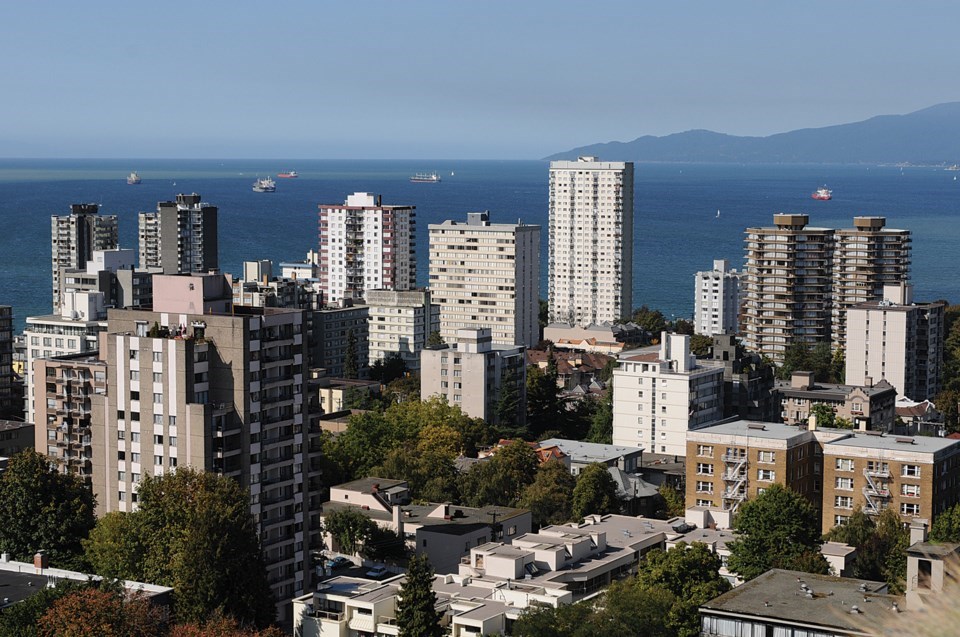University researchers identified 823 short-term rentals tied to Airbnb and Vrbo in Vancouver that stopped being used for short-term stays during the first year of the pandemic, with more than 40 per cent of landlords returning their units to the long-term rental market.
Although the shift created more rental housing — the primary goal of the city’s short-term regulations implemented in 2018 — it didn’t result in cheaper rents, according to a study prepared for the City of Vancouver by researchers at McGill University’s school of urban planning.
“These former [short-term rentals] have asking rents on average 23.2 per cent higher than other [long-term rental] listings, but are correlated with a 13.5 per cent decrease in overall asking rents in Vancouver,” said the study, which was completed in January 2021 but only shared with city council last month.
Authors David Wachsmuth, Maxime Belanger De Blois and Cloe St-Hilaire said their evidence suggests the overwhelming majority of short-term rental listings transferred to the long-term market belonged to commercial operators.
That conclusion was reached after they used image recognition software to identify 823 unique Airbnb and Vrbo short-term rentals posted on Craigslist or Kijiji between March 2020 — when the pandemic was declared — and September 2020.
Many of the long-term rentals were also advertised as furnished.
The authors said it would be highly unlikely for a “casual homeowner” operating a short-term rental to vacate their home, list it on Craigslist or Kijiji and re-use the photo used to advertise their place as a short-term rental.
Nearly half downtown
Of the 823 listings matched to Craigslist and Kijiji, nearly half (49.7 per cent) were located downtown, with the remaining matches more evenly split between the West End (10.7 per cent), Kitsilano (7.5 per cent) and Mount Pleasant (4.4 per cent).
A total of 521 Airbnb and Vrbo hosts’ identification was linked to the 823 listings.
“We estimate that 40.7 per cent have fully transitioned back to the long-term market, 22 per cent have been temporarily blocked on Airbnb and may return to being [short-term rentals] in the future, and 37.3 per cent failed to be rented on [long-term rental] platforms and instead remain active on Airbnb,” the authors said.
At the same time, current city statistics show a rebound in the short-term rental market since the first year of the pandemic.
As of Feb. 3, 2022, there were 2,501 short-term rental listings in Vancouver — an increase since the summer of 2020 when listings were in the hundreds, but still a considerable drop from almost 6,000 active in January 2020.
Meanwhile, the Canada Mortgage and Housing Corporation's annual rental market report released in February said the average two-bedroom long-term purpose-built rental unit in Metro Vancouver was renting for $1,824 per month. The vacancy rate for that type of housing was 1.2 per cent.
The vacancy rate was 0.8 per cent for a condo, with the average two-bedroom going for $2,498 per month.
The city first began regulating short-term rentals in April 2018.
Under the bylaw, a person who provides temporary accommodation in a dwelling unit other than a bed and breakfast or hotel is deemed a short-term rental operator and is required to obtain a business licence; it’s $104 this year.
The accommodation must be provided in the operator’s principal residence. The bylaw says an operator can rent their entire home, or a room within that home, for less than 30 consecutive days at a time.
The study said regulations implemented in 2018 created a one-time “negative shock” in the number of listings and “significantly and durably reduced” the size of the short-term rental market.
“Vancouver now fares substantially better on these metrics than either its peer cities Montreal and Toronto, or the rest of the Metro Vancouver region,” the study said.
In examining data between 2016 and 2020, the authors estimated the regulations reduced active short-term rental listings by 1,090 — a 24.7 per cent decrease, as of the second half of 2019.
For the same timeframe, an estimated 510 housing units had returned to the long-term market, the authors said.
The authors suspect the pandemic has likely continued that trend — as the city's business licence recent data indicates — but their research ended as 2020 came to a close.
880 business licences suspended
Airbnb is the largest of several platforms offering short-term rentals in Vancouver and accounts for at least 82 per cent of all active listings, according to the city. The next largest platform is Expedia (including VRBO), followed by Flipkey, which is owned by TripAdvisor.
The city’s website indicates 880 business licences were suspended since the bylaw was enacted in 2018. In addition, more than 1,400 warning letters and 1,606 tickets were issued and 177 listings referred to prosecution.
Meanwhile, Airbnb is challenging a B.C. privacy commissioner office ruling that ordered the City of Vancouver to disclose the names, addresses and business licence data of short-term rental hosts to a housing activist.
The online rental giant filed a petition for judicial review Jan. 28 in B.C. Supreme Court in an attempt to overturn a ruling in December made by Elizabeth Barker of B.C.’s Information and Privacy Commissioner office to disclose the information.
@Howellings



